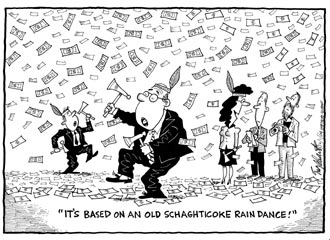 Another Stereotype of the Month entry:
Another Stereotype of the Month entry:
 Another Stereotype of the Month entry:
Another Stereotype of the Month entry:
Posted on Mon, Apr. 26, 2004
Indian Gaming Regulatory Act written in haste, full of waste
BY TIM GIAGO (NANWICA KCIJI)
Lakota Media Inc.
Indian casinos have become so lucrative in California that some tribes are kicking tribal members off their rolls in order to reduce the number of people receiving per capita payments. There are stories of wealthy financiers seeking out small numbers of people willing to pass as Indians and putting up the money the help them form a tribe. The stories go that these wealthy moneymen are willing to buy land for them so they can form an Indian reservation.
Most of us knew that it would just be a matter of time before this happened. The Bureau of Indian Affairs has not helped in the matter. They have been handing out federal recognition to questionable Indian tribes like they were awarding diplomas. With diploma in hand, some of these newly formed tribes are now very wealthy.
We have to stop this nonsense. I implore my readers to contact their Congressional delegation and beg them to force the BIA to include one other provision in the criteria for federal recognition: make it a part of the recognition process that every newly recognized tribe must wait at least 10 years before opening a casino.
Rob's comment
This editorial is hard-edged but generally accurate. The stereotypical part is the line
They [the BIA] have been handing out federal recognition to questionable Indian tribes like they were awarding diplomas.
Schools award hundreds of diplomas a year, while the BIA awards federal recognition only once every couple years. Dozens of tribes are backlogged in the recognition process and awaiting the BIA's consideration. That doesn't sound like the out-of-control system Giago portrays it. It sounds like a system that's taking its time to do things right.
In fact, the BIA turns down many more petitions than it approves. That's nothing like the stereotypical diploma mill. It's more like the typical meritocracy where only the best candidates rise to the top.
If the recognition process is so corrupt, as critics charge, why do so many tribes fail to master it? Are the "fake" Indians succeeding while the "real" Indians aren't? What does that say about the real Indians: that they're too dumb or ignorant to win recognition? Or what, exactly?
Here are the Facts About American Indians Today:
Of the 150 petitions for federal recognition received by the BIA since 1978, 12 have received acknowledgment through the BIA process, two groups had their status clarified by the Department of the Interior through other means, and seven were restored or recognized by Congress.
That's 21 tribes at most recognized out of 150 petitions—a paltry 14% success rate. This is the tidal wave of recognition Giago and other critics are complaining about?
Also problematical is this claim:
Indian casinos have become so lucrative in California that some tribes are kicking tribal members off their rolls in order to reduce the number of people receiving per capita payments.
No tribe that I know of has said it's disenrolling some members to increase the per capita payments of others. Every tribe that I know of has asserted a legitimate reason for disenrolling members. Giago is echoing the conservative argument that gaming tribes are greedy by definition.
Related links
Greedy Indians
The facts about Indian gaming
|
. . . |

|
All material © copyright its original owners, except where noted.
Original text and pictures © copyright 2007 by Robert Schmidt.
Copyrighted material is posted under the Fair Use provision of the Copyright Act,
which allows copying for nonprofit educational uses including criticism and commentary.
Comments sent to the publisher become the property of Blue Corn Comics
and may be used in other postings without permission.